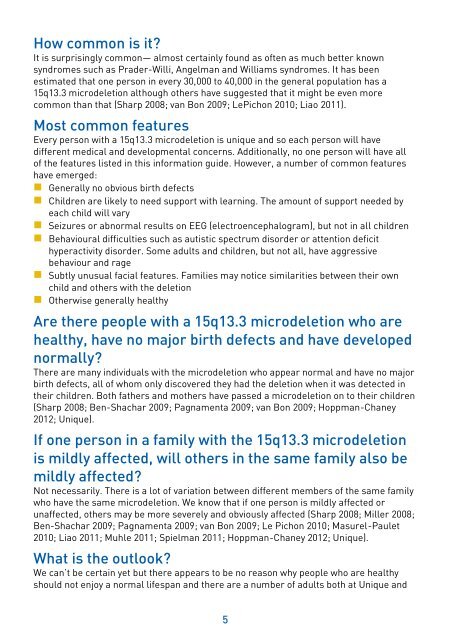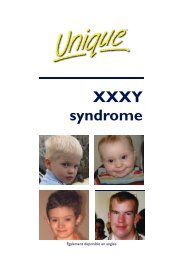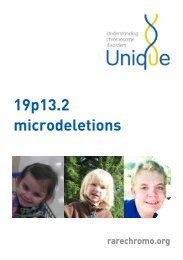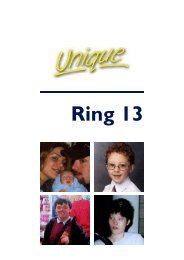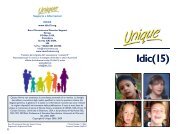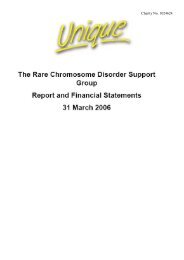15q13.3 microdeletion syndrome - Unique - The Rare Chromosome ...
15q13.3 microdeletion syndrome - Unique - The Rare Chromosome ...
15q13.3 microdeletion syndrome - Unique - The Rare Chromosome ...
Create successful ePaper yourself
Turn your PDF publications into a flip-book with our unique Google optimized e-Paper software.
How common is it?<br />
It is surprisingly common— almost certainly found as often as much better known<br />
<strong>syndrome</strong>s such as Prader-Willi, Angelman and Williams <strong>syndrome</strong>s. It has been<br />
estimated that one person in every 30,000 to 40,000 in the general population has a<br />
<strong>15q13.3</strong> <strong>microdeletion</strong> although others have suggested that it might be even more<br />
common than that (Sharp 2008; van Bon 2009; LePichon 2010; Liao 2011).<br />
Most common features<br />
Every person with a <strong>15q13.3</strong> <strong>microdeletion</strong> is unique and so each person will have<br />
different medical and developmental concerns. Additionally, no one person will have all<br />
of the features listed in this information guide. However, a number of common features<br />
have emerged:<br />
• Generally no obvious birth defects<br />
• Children are likely to need support with learning. <strong>The</strong> amount of support needed by<br />
each child will vary<br />
• Seizures or abnormal results on EEG (electroencephalogram), but not in all children<br />
• Behavioural difficulties such as autistic spectrum disorder or attention deficit<br />
hyperactivity disorder. Some adults and children, but not all, have aggressive<br />
behaviour and rage<br />
• Subtly unusual facial features. Families may notice similarities between their own<br />
child and others with the deletion<br />
• Otherwise generally healthy<br />
Are there people with a <strong>15q13.3</strong> <strong>microdeletion</strong> who are<br />
healthy, have no major birth defects and have developed<br />
normally?<br />
<strong>The</strong>re are many individuals with the <strong>microdeletion</strong> who appear normal and have no major<br />
birth defects, all of whom only discovered they had the deletion when it was detected in<br />
their children. Both fathers and mothers have passed a <strong>microdeletion</strong> on to their children<br />
(Sharp 2008; Ben-Shachar 2009; Pagnamenta 2009; van Bon 2009; Hoppman-Chaney<br />
2012; <strong>Unique</strong>).<br />
If one person in a family with the <strong>15q13.3</strong> <strong>microdeletion</strong><br />
is mildly affected, will others in the same family also be<br />
mildly affected?<br />
Not necessarily. <strong>The</strong>re is a lot of variation between different members of the same family<br />
who have the same <strong>microdeletion</strong>. We know that if one person is mildly affected or<br />
unaffected, others may be more severely and obviously affected (Sharp 2008; Miller 2008;<br />
Ben-Shachar 2009; Pagnamenta 2009; van Bon 2009; Le Pichon 2010; Masurel-Paulet<br />
2010; Liao 2011; Muhle 2011; Spielman 2011; Hoppman-Chaney 2012; <strong>Unique</strong>).<br />
What is the outlook?<br />
We can’t be certain yet but there appears to be no reason why people who are healthy<br />
should not enjoy a normal lifespan and there are a number of adults both at <strong>Unique</strong> and<br />
5


